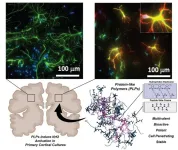(Press-News.org) Standard chemotherapy regimens, which are mostly based on testing in relatively young and healthy patients, may do more harm to older adults with cancer who often struggle with other health issues. New research, published yesterday in JAMA Network Open, shows that lowering the dose and adjusting the schedule of how chemotherapy is given to older adults with advanced cancer can make life better for patients, without compromising their treatment goals.
The study, which was led by researchers from the University of Rochester Medical Center’s Wilmot Cancer Institute, focuses on how well older people tolerate chemotherapy. More than 30 percent of patients benefitted from treatment regimen modifications that helped them avoid toxic side effects and retain the ability to perform daily functions for themselves, such as bathing, dressing, eating, and walking.
Wilmot researchers Mostafa R. Mohamed, MD, PhD, and Supriya G. Mohile, MD, MS, led the study, which analyzed data from more than 600 study participants over the age of 70 who participated in the national clinical trial known as GAP70+.
Nearly half of all GAP70+ participants received a modified treatment regimen, defined as any treatments that deviated from the National Comprehensive Cancer Network guidelines or published clinical trials. Lower doses and altered chemotherapy schedules were the most common modifications identified in the study.
Compared with patients who received standard treatment regimens, patients who had modified treatments had a 15 percent reduced risk of serious clinician-rated toxic effects and a 20 percent reduced risk of patient-reported functional decline. Patients with modified treatment regimens also had 32 percent lower odds of having a worse composite adverse outcome, which suggests the treatment modification did not compromise efficacy.
This study is among just a handful of such studies that exclusively focus on older adults with advanced cancer who receive chemotherapy. Authors believe this information can help healthcare providers as choose the best care plans for older patients with advanced cancer.
END
Modifying chemotherapy treatment can make life better for older adults with cancer
2024-02-16
ELSE PRESS RELEASES FROM THIS DATE:
Widely used machine learning models reproduce dataset bias in Rice study
2024-02-16
HOUSTON – (Feb. 16, 2024) – Rice University computer science researchers have found bias in widely used machine learning tools used for immunotherapy research.
Ph.D. students Anja Conev, Romanos Fasoulis and Sarah Hall-Swan, working with computer science faculty members Rodrigo Ferreira and Lydia Kavraki, reviewed publicly available peptide-HLA (pHLA) binding prediction data and found it to be skewed toward higher-income communities. Their paper examines the way that biased data input affects the algorithmic recommendations being ...
Study finds risk-reducing mastectomy (RRM) may lower breast cancer mortality
2024-02-16
A study co-led by Professor Kelly Metcalfe of the Lawrence Bloomberg Faculty of Nursing, and researchers at the Familial Breast Cancer Research Unit at Women’s College Hospital, finds risk-reducing mastectomies (RRM) in women with a BRCA1 or BRCA2 genetic variant, significantly reduces the risk of being diagnosed with breast cancer and lowers the probability of death.
The study, published in the British Journal of Cancer, examined how RRM affects the rate of death of women with a pathogenic variant but no cancer diagnosis. To date, there has been only one other study published by researchers in the Netherlands that examines the impact ...
Hope Foundation announces Goodman for Inaugural Meyskens Lecture
2024-02-16
The Hope Foundation for Cancer Research, the public charity supporting SWOG Cancer Research Network, has recently established the Frank and Linda Meyskens Annual Endowed Lectureship on Advances in Cancer Prevention. Since the early 1980’s, Dr. Meyskens has been a leader in the recognition, development, and clinical usage of Prevention in the management of cancer. Frank and Linda have directed the development of this lectureship to advance the explosion of knowledge that is expanding opportunities to engage Prevention in personalized medicine, including early detection and genetically ...
Rare case of opossum infected by rabies sounds alarm regarding circulation of this virus in urban environments
2024-02-16
A female White-eared opossum (Didelphis albiventris) found dead in 2021 in Bosque dos Jequitibás Park in the center of Campinas, one of the largest cities in São Paulo state, Brazil, died from rabies meningoencephalitis, according to a group of researchers at the University of São Paulo (USP) and Adolfo Lutz Institute (IAL), the regional reference laboratory, working with health professionals affiliated with public institutions in São Paulo city and Campinas.
Reported in an article published in the journal Emerging Infectious Diseases, the finding serves as an alert to the presence of the virus, which is deadly to humans, ...
Targeting 'undruggable' proteins promises new approach for treating neurodegenerative diseases
2024-02-16
Researchers led by Northwestern University and the University of Wisconsin-Madison have introduced a pioneering approach aimed at combating neurodegenerative diseases such as Alzheimer's disease, Parkinson's disease and Amyotrophic lateral sclerosis (ALS).
In a new study, researchers discovered a new way to enhance the body’s antioxidant response, which is crucial for cellular protection against the oxidative stress implicated in many neurodegenerative diseases.
The study published today (Feb. 16) in the journal Advanced Materials.
Nathan Gianneschi, the Jacob & Rosaline Cohn Professor of Chemistry at Northwestern’s Weinberg ...
Anoxic marine basins are among the best candidates for deep-sea carbon sequestration
2024-02-16
(Santa Barbara, Calif.) — Anoxic marine basins may be among the most viable places to conduct large-scale carbon sequestration in the deep ocean, while minimizing negative impacts to marine life. So say UC Santa Barbara researchers in a paper published in the journal AGU Advances. As we explore ways to actively draw down the levels of carbon in the atmosphere, sending plant biomass to these barren, oxygen-free zones on the seafloor becomes an option worth considering.
“The big picture here is that all the best models that we have say that we have to do some form of net negative CO2 removal in order to hit climate goals,” said geochemist, geobiologist ...
NIH trial data underpins FDA approval of omalizumab for food allergy
2024-02-16
Today’s Food and Drug Administration approval of a supplemental biologics license for the monoclonal antibody omalizumab (Xolair) highlights the vital role of the National Institutes of Health-supported research that underpins the FDA decision.
FDA has approved omalizumab for the reduction of allergic reactions, including anaphylaxis, that may occur with an accidental exposure to one or more foods in adults and children aged 1 year and older with food allergy. People taking omalizumab still need to avoid exposure to foods to which they are allergic. Omalizumab previously received FDA approval ...
Moffitt study finds neoadjuvant chemotherapy significantly improves outcomes for penile squamous cell carcinoma patients
2024-02-16
TAMPA, Fla. — Penile squamous cell carcinoma is a rare malignancy with limited treatment options and poor prognosis, especially in advanced stages. Because of its rarity, few studies focus on better understanding and managing this disease. In a new article published in the Journal of the National Cancer Institute, Moffitt Cancer Center researchers share data on the efficacy and safety of neoadjuvant chemotherapy for locally advanced penile squamous cell carcinoma, addressing a critical gap in evidence regarding treatment options for this rare and aggressive cancer.
The Moffitt team, in collaboration with institutions across ...
New paper proposes standards – and actionable clinical tools – for biomarkers of aging
2024-02-16
A new paper led by Harvard researchers has zeroed in on biomarkers of aging using omic data from population-based studies. The team, which included aging and longevity expert Alex Zhavoronkov, PhD, founder and CEO of AI-driven drug discovery company Insilico Medicine, provided a framework for standardizing the development and validation of biomarkers of aging to better predict longevity and quality of life. The findings appeared in Nature Medicine.
Biomarkers are biological characteristics that can be measured and used to evaluate various biological processes, ...
Researchers identify genes and cell types that may have causal role in primary open-angle glaucoma formation
2024-02-16
Although primary open-angle glaucoma (POAG) is the leading cause of blindness in people over the age of 55, there remains no cure for the disease and its biological mechanisms are not well understood. Elevated intraocular pressure (IOP) is a major risk factor for the disease, but many patients with glaucoma have normal eye pressure and still lose vision.
In a new study published this past month in Nature Communications, researchers from Mass Eye and Ear, led by Ayellet Segrè, PhD, conducted a comprehensive study that combined genetic discoveries from a large cross-ancestry genome-wide association study meta-analysis of POAG, led by Janey Wiggs, MD, PhD, ...



